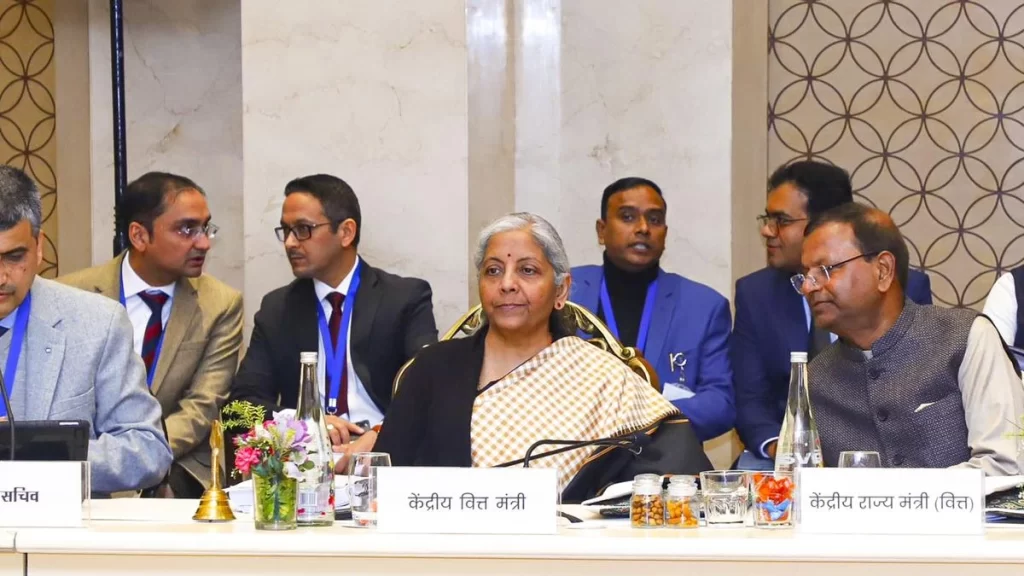The Goods and Services Tax (GST) Council, during its 55th meeting chaired by Union Finance Minister Nirmala Sitharaman, postponed the much-awaited review of GST rates on life and health insurance policies. The decision was deferred to allow further deliberations, as some members requested additional discussions before finalizing the tax rates.
The council has entrusted a Group of Ministers (GoM), led by Bihar Deputy Chief Minister Samrat Chaudhary, with re-examining the insurance tax rates. The GoM will revisit the matter and present its findings and recommendations at a subsequent council meeting. Additionally, proposals for rate rationalization on approximately 150 items were deferred, including a differential levy based on garment pricing and a 5% tax rate for packaged drinking water and bicycles priced under ₹10,000.
Ministerial Roadmap on GST Compensation Cess Extended
The council extended the timeline for a ministerial group tasked with formulating a roadmap for managing the GST Compensation Cess. This cess, which applies to certain goods and services, is set to lapse in March 2026. The decision provides the group more time to develop recommendations.
Key Decisions and Clarifications
Despite deferring major rate reviews, the council approved several critical changes, including:
- Tax Exemptions:
- Gene Therapy: Recognized for its role in treating life-threatening conditions, gene therapy was exempted from GST.
- Defence Systems: Long-range surface-to-air missiles (LRSAMs) and related components were exempted from Integrated GST (IGST), ensuring streamlined costs for manufacturing and assembly in defence projects.
- Revised Tax Rates:
- Used Car Sales: The tax on pre-owned vehicles, including electric cars, was increased from 12% to 18%.
- Popcorn Categories:
- Sweetened or caramelized popcorn will attract 18% GST.
- Salty and spicy popcorn, when not pre-packed or labeled, will be taxed at 5%.
- Pre-packaged savory popcorn will be subject to a 12% tax.
- Public Welfare Reductions:
- The GST rate for fortified rice kernels intended for public distribution to economically weaker sections was reduced from 18% to 5%.
- Clarifications:
- Gift Vouchers: These will not attract GST.
- Penal Charges: Fees imposed on borrowers by banks or non-banking financial companies (NBFCs) for non-compliance with loan conditions are exempt from GST.
A proposal to tax charges collected by municipalities for granting Floor Space Index (FSI) to builders was deferred. The Centre urged a closer examination, emphasizing that such charges pertain to municipal and local authorities.
At Andhra Pradesh’s request, the council approved the creation of a ministerial group to study and propose a uniform policy for taxes levied by states during natural disasters. This initiative aims to address legal and structural challenges associated with disaster-related taxes and ensure consistency across states.
Speaking after the council meeting, Finance Minister Nirmala Sitharaman highlighted the importance of the new exemptions and clarified decisions:
- “Gene therapy, vital for addressing critical diseases, has been fully exempted. Similarly, the exemptions for LRSAM systems and their components underscore our commitment to defence modernization.”
- On public welfare, she emphasized, “The reduction in GST on fortified rice kernels reflects our dedication to making essential nutrition accessible to vulnerable sections.”
Next Steps and municipal levies. The GoM is expected to reconvene soon to address these pending matters and present detailed recommendations at future council sessions.
By balancing rate rationalization, welfare measures, and exemptions, the GST Council continues to fine-tune India’s indirect tax framework to meet evolving economic and public needs.






